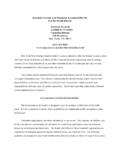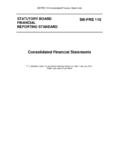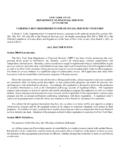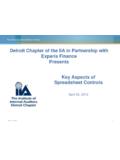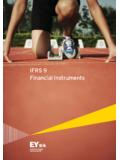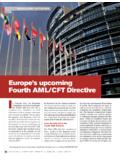Transcription of Financial Controls for Small Organisations
1 Financial Controls (December 2012) Page 1 Financial Controls for Small Organisations (December 2012) A voluntary/community group is set up for the public good . Therefore it wants to be able to show that it uses any money it receives appropriately. However very often arguments and accusations about money, even if unfounded, can seriously damage the reputation of the organisation and the people running it. The buck for control of Financial affairs stops with the committee. If the organisation is a charity and/or a company then there are other legal responsibilities on the trustees and directors. A lack of Financial control could lead to fraud or expensive mistakes being made or unauthorised spending.
2 Signs of weak control , and so more likelihood of things going wrong, include: Trustees/committee members not understanding their Financial responsibilities Lack of reporting to the trustees/committee members Decisions taken by inappropriate people Disputes within the organisation about the future direction of the organisation (so the group's resources are used on inappropriate activities) Lack of formal Financial procedures When things go wrong financially very often there are allegations made, both internally and externally, about fraud and malpractice. Therefore it is good practice to have written procedures for handling, recording and reporting on money matters, which are regularly reviewed.
3 Any such procedure won t guarantee total protection but it will help minimise and protect trustees/committee members from accusations of poor management (as long as they make sure the procedure is being followed!). Below is an example of such a policy for Small Organisations . However it will need to be tweaked depending on how you operate, but remember some basic principles: Not to allow one person to have sole responsibility (to protect them and the organisation) Always have some documentation to support spending and income Try to use a bank account to record all income and spending Try to set up regular checks Sample Policy (adapted from an article published by CASH: ) 1. Introduction Financial records will be kept so that Anyorg can: a.
4 Meet its legal and other obligations, , Charities Acts, Inland Revenue, Customs & Excise, Companies Act, Common Law. b. Enable the Trustees/Committee members to have control of the Organisations finances. Bournemouth Council for Voluntary Services 01202 466130 Financial Controls (December 2012) Page 2 c. Enable the organisation to meet contractual obligations and the requirements of funding bodies. The organisation will keep proper books of account (which may be electronic) and appropriate backups, which will include: a. A cash book analysing all the transactions in the organisation's bank account(s) detailing any transactions relating to restricted funds. b. A petty cash book if cash purchases are being made.
5 C. Inland Revenue deduction cards P11 (if registered for PAYE) The Financial year for Anyorg will end on day/month. Accounts (and Trustees Annual Report if a charity) will be drawn up after each Financial year within 3 months of the end of the year and presented to the next Annual General Meeting. Before the start of each Financial year, the Committee will approve a budgeted income and expenditure account for the following year. The committee will receive regular Financial reports in an agreed format that is understandable, accurate and timely, to be sent to members at least 7 days before the meeting. A paper comparing actual income and expenditure with the budget, with explanations of any significant differences, will be presented to the Committee every 3 months as a minimum.
6 The AGM will appoint an appropriately qualified auditor/independent examiner to audit/examine the accounts for presentation to the next AGM. 2. Bank Anyorg will bank with the Anybank Bank at its Anyroad branch where the accounts will be held in the name of Anyorg. The following accounts will be maintained: Current, Reserve, and any other project accounts as agreed and approved by the Anyorg Committee. The bank mandate (list of people who can sign cheques on the organisation's behalf) will always be approved and minuted by the Committee as will all changes to it. Anyorg will require the bank to provide statements every month and these will be reconciled with the cash book every month.
7 The Treasurer or another committee member (if the reconciliation is carried out by the Treasurer) will spot check that this reconciliation has been done at least twice a year, and report to the full committee. Anyorg will not use any other bank or Financial institution or use overdraft facilities or invest speculatively unless authorised, approved and minuted by the Committee. Bournemouth Council for Voluntary Services 01202 466130 Financial Controls (December 2012) Page 3 3. Receipts (income) The aim is to demonstrate that Anyorg has received all the income to which it is entitled and that it is all reasonably evidenced. All cash income will be banked as soon as possible without deduction of expenses.
8 All monies received will be recorded promptly in the cash analysis book and banked without delay (note this includes sundry receipts such as payments for telephone calls, photocopying, etc.). The organisation will maintain files of documentation letters from funding bodies to back this up. Money from each fundraising event and collection boxes will be counted in the presence of two people and separately recorded. Any unbanked cheques or income will be securely stored. 4. Payments (expenditure) The aim is to ensure that all expenditure is on Anyorg s business and is properly authorised and that this can be demonstrated. The latest approved budget provides the cheque signatories with authority to spend up to the budgeted expenditure, not beyond it.
9 Payments in cash should be kept to a minimum and generally for Small amounts through the petty cash system. Otherwise all payments should be by cheque. X will be responsible for holding the cheque book (unused and partly used cheque books) which should be kept under lock and key. Blank cheques will NEVER be signed. Whenever possible, the same person should not be responsible for ordering, processing and checking invoices as well as raising cheque requisitions, signing cheques and payments. The relevant payee's name will always be written on the cheque before signature, the cheque stub will always be filled in. No cheques will be signed without original documentation. Money will only be spent to meet conditions and requirements of the funding bodies and in pursuance of the Objectives of the Constitution.
10 The signatories shall not approve an overspend on a particular budget heading of more than 10% unless this approval should be written down, signed by both people approving it, and reported to the next Committee meeting. Cheques up to X may be signed by Y and Z, and up to A by B and C. Bournemouth Council for Voluntary Services 01202 466130 Financial Controls (December 2012) Page 4 5. Payment Documentation Every payment out of the Organisations bank amounts will be supported by an original invoice (never against a supplier s statement or final demand). That original will be filed and kept for seven years. The person who signs the cheque should ensure that the invoice is referenced with: Cheque number Date cheque drawn Amount of cheque The only exceptions to cheques not being supported by an original invoice would be for such items as advanced booking fees for a future course, VAT, etc.

